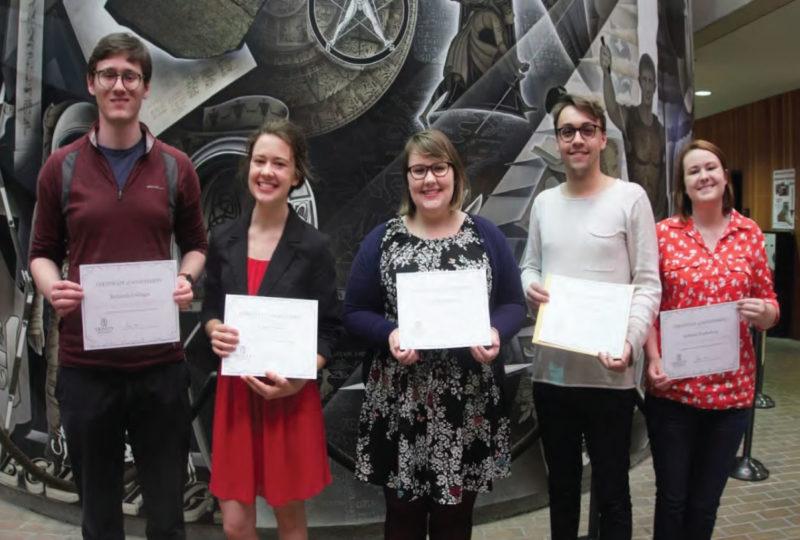The assignment of a research paper is often viewed as a daunting task that may involve long nights grueling over a computer in Coates Library with several cups of coffee nearby. However, for some students, this is an opportunity to ask questions about the world, explore various topics of interest and create a substantial product that documents one’s genuine curiosity. Some of these students include the recipients of the Undergraduate Student Research Awards.
This competition, hosted by Trinity University’s Coates Library, recently awarded five students for their achievements in conducting research using library and information services. The winners received awards ranging from $100 to $1,000 and were invited to present at the Humanities Collective if their selected project focused on topics relevant to humanities research.
These students ranged from a number of different grade levels and covered a variety of topics; some of these projects included a study of romantic poetry to the 2001 authorization of military force in the United States. All of these papers, along with past awarded works, are available for viewing on the Trinity Digital Commons website.
For many, this process began through some research assignments in different classes; these papers were later submitted as competitors into this event.
“I was in Dr. [Alfred] Montoya’s Intro to Anthropology class last semester, and we were assigned to write a 10-page ethnography, which is a study of a people group, as a final project at the end of the semester. So I chose to do my field work at Casa RAICES, which is a shelter for migrants from Central America. It’s predominantly asylum seekers, women and children who are fleeing gang violence in Central America,” said Aubrey Parke, first-year anthropology student.
Many of these students worked closely with their professors in order to get the best feedback and guidance available while they were conducting their research. Samantha Heffner, a senior English and history double major, started her research for her topic at the beginning of the fall semester. She frequently reached out to her advisor for assistance as she wrote the paper.
“I worked very closely with Dr. [Betsy] Tontiplaphol in the English department. She was my thesis advisor and academic advisor and we met once a week, every week and we would go over what I had worked on up to that point,” Heffner said.
For senior history major, Katie Funderburg, this was not the first time her research had been commended. She wrote her paper, “Barons and Yeomen, Venison and Vert: A Comparative Analysis of the Magna Carta and A Gest of Robyn Hode in the Context of Forest Law” during the spring of her junior year. During that semester, her work was awarded the Francis Callum Hendrix Award for history. This paper is also being published in the Expositor Journal of undergraduate humanities research. Her previous rewards for this paper encouraged her to enter it again.
“I was already happy with that paper and knew it was going over well with people, since it won the history award. It was fortunate that since I submitted it for that award, I got some more editing feedback from my professor after it had been graded.”
These award winners were selected from a competitive pool of 22 entries and were chosen by the Undergraduate Student Research Awards Evaluation Committee, which is chaired by head of instruction services, Benjamin Harris.
“It is always thrilling to reward the efforts of our students, and this year’s recipients were more than deserving. I hope that their work inspires future students to see the potential of their class assignments. Whether you are conducting research for a paper or a presentation, that’s an opportunity to really create something, to do something that has a life beyond the grade and beyond the class. I truly can’t wait to see next year’s submissions,” Harris said.
After all the work these various students put into their unique research projects, they are happy to see that their work would be recognized. Sophomore history and international studies double major, Benjamin Collinger, recognized the intensity of the competition, and is grateful that he was chosen as a recipient.
“I feel really honored to be one of the few people chosen, especially in a school like Trinity. There’s a lot of fantastic researchers and writers and I feel honored to be a part of that,” Collinger said.
Junior philosophy major Daniel Conrad was excited to have his discipline’s research process recognized in the competition.
“I was almost surprised to see that my summer research on the philosophy of artworks and games had been selected for an award,” Conrad said. “I was honored to work on my research this past summer under the Summer Undergraduate Research Fellowship program hosted by the Mellon Initiative, so I was working in the library daily.”
Conrad explained the various resources that were available to his research.
“I was able to receive inter-library loans to find books that our library didn’t own in print,” Conrad said. “One of the library liaisons, Michael Hughes, was particularly interested in both the philosophical and the game aspects of my research, and he would send me relevant article citations for my use. And the Mellon Initiative funded my travel to present work at a conference on aesthetics and games philosophy last October, which was an incredible experience in itself but also allowed me to discuss my ideas with professionals and even the scholar my paper primarily disagreed with.”
Staff disclosure: Daniel Conrad is a news reporter for the Trinitonian.







